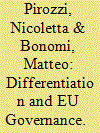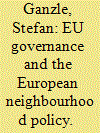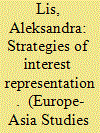|
|
|
Sort Order |
|
|
|
Items / Page
|
|
|
|
|
|
|
| Srl | Item |
| 1 |
ID:
183852


|
|
|
|
|
| Summary/Abstract |
Existing literature on differentiated integration has made an important contribution in theorising and operationalising its regulatory dimension. However, in order to fully evaluate the impact of differentiation on EU governance, this approach needs to be enriched with additional elements. The organisational element allows us to grasp the different forms, venues and actors of differentiation. The constitutional element connects the different forms of differentiation to the foundations of EU constitutionalism and identity. The socio-political element goes beyond the analysis of differentiation as a policy practice and qualifies it as a policy choice. On this basis, a generalisation is proposed resulting from a comparative analysis of a wide range of contributions in different policy sectors in order to assess differentiation in the EU’s governance against three main criteria: effectiveness, sustainability and accountability/legitimacy.
|
|
|
|
|
|
|
|
|
|
|
|
|
|
|
|
| 2 |
ID:
092152


|
|
|
|
|
| Publication |
2009.
|
| Summary/Abstract |
Since 2002 the European Union (EU)1 has sought to flesh out a proximity policy to deal with its immediate vicinity in the light of EU Eastern enlargement. Several labels, such as 'Eastern (and Southern) Dimension', 'Wider Europe', 'European Neighbourhood Policy' (ENP), 'ENP plus' and, eventually-with regards to East European countries outside the EU-'Eastern Partnership' have been used to capture the EU's policy vis-a-vis its different neighbours. So far, Algeria, Israel, the Palestinian Authority, Armenia, Jordan, Syria, Azerbaijan, Lebanon, Tunisia, Ukraine, Egypt, Moldova, Georgia and Morocco have been recognised as 'ENP partner' countries.
|
|
|
|
|
|
|
|
|
|
|
|
|
|
|
|
| 3 |
ID:
095175


|
|
|
|
|
| Publication |
2010.
|
| Summary/Abstract |
Distinguishing between '(good) governance' as a process and an outcome, this article examines both the processes and outcomes of governance in the context of the EU's relationship with ACP states since the adoption of the Cotonou Agreement. The article discusses and assesses a variety of governance mechanisms, including the European Commission's use of the governance concept, Economic Partnership Agreements, manifestations of partner preferences, the European Development Fund, the revision of the Cotonou Agreement, and Fisheries Partnership Agreements. Specific examples of the wielding of each mechanism are assessed based upon two criteria: the extent to which the wielding of the mechanism by the EU is a manifestation of 'good governance', and the extent to which the mechanisms have resulted, or are likely to result, in the sustainable development of and reduction of poverty in ACP countries. The examples are chosen to illustrate contradictions between rhetoric and practice and the consequential negative (actual and potential) impact upon development in ACP states. The article ends with some suggestions for improving the EU's governance processes and their outcomes for development.
|
|
|
|
|
|
|
|
|
|
|
|
|
|
|
|
| 4 |
ID:
107052


|
|
|
|
|
| Publication |
2011.
|
| Summary/Abstract |
Drawing on the literature of EU governance in its neighbourhood, this article investigates the EU's impact on Georgia by examining the following policies regarding EU-Georgia relations during the period 2004-2008: single market access; energy security; and foreign and security policy. It argues that policy-level incentives and the overall process of deepening relations with the EU are necessary conditions for the EU to make an impact. However, the EU-promoted rules and norms are key conditions for EU impact and for understanding whether they are adopted or not. The case of Georgia shows the limits of the EU's normative power. Geopolitical pressures and alternative models of development present a challenge for EU impact.
|
|
|
|
|
|
|
|
|
|
|
|
|
|
|
|
| 5 |
ID:
128992


|
|
|
|
|
| Publication |
2014.
|
| Summary/Abstract |
Poland's European Union accession afforded Polish trade unions membership of European-wide, umbrella trade union organisations. This essay evaluates the strategies Polish trade unions adopted to represent their interests following Poland's accession to the European Union. It draws on a series of interviews and document analysis. In addition the essay seeks to gauge the extent to which Polish trade unions were 'Europeanised', understood in both the context of their adoption of European policy models and their ability to win support for their causes at the European level.
|
|
|
|
|
|
|
|
|
|
|
|
|
|
|
|
|
|
|
|
|